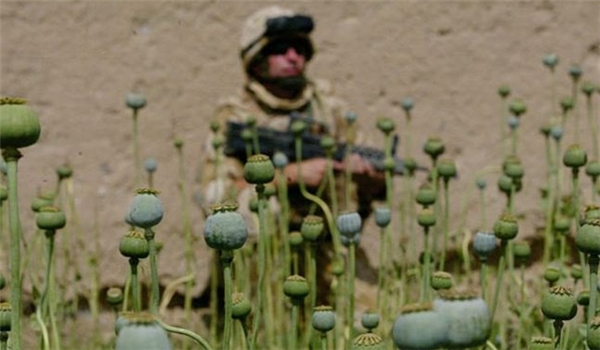
RNA - Afghanistan is not just the longest war in American history but possibly the longest opium war in anyone’s history. In the end, it never goes well. It is going badly right now, and part of that can be explained by the policies of those most deeply hooked on the war. When things go badly for them, the occupiers turn off the information spigot, as in 2015 when the American command in Afghanistan cut off all public release of material on “US efforts to build, train, equip, and sustain the Afghan National Security Forces.”
For now, though, Donald Trump’s White House says the US is staying in Afghanistan to fight and - so they insist - win. To this end, the CIA brags about a complementary covert surge with lethal drone strikes and “highly experienced” paramilitary teams being dispatched to "hunt and kill” Taliban guerrillas, both ordinary fighters and top officials.
CIA Director Mike Pompeo has even promised a wave of extrajudicial killings reminiscent of the Agency’s notorious Phoenix Program during the Vietnam War. CIA paramilitary officers will lead Special Forces operatives, both Afghan and American, in expanded counter-terrorism operations that, in the past, have been accused of indiscriminately killing Afghan civilians.”
In short, it’s game on in Afghanistan. After 16 years of continuous war in that country, the obvious question is: Does this new campaign have any realistic chance of success, no less victory? To answer that, another question must be asked: How has the Taliban managed to expand in recent years despite intensive US operations and a massive air campaign? After all, the Afghan War is not only the longest in US history, but also one of the largest, peaking at 101,000 American troops in country during President Obama’s surge of 2010-2011.
As with any movement, there are multiple reasons for the Taliban’s success, including the failure of the US-led coalition and Afghan-building program, the country’s martial tradition of fighting foreign occupiers, Saudi Arabia’s indirect support, as well as the wide-open sanctuaries in tribal backlands along the Afghan border. But there is one other factor, more fundamental than all the rest: the opium poppy.
According to the US commander in Afghanistan, General John Nicholson, a single Afghan province, Helmand, “produces a significant amount of the opium globally that turns into heroin and provides about 60 percent of the Taliban funding.” The country’s president, Ashraf Ghani, a former World Bank official, agrees. “Without drugs,” he says, “this war would have been long over. The heroin is a very important driver of this war.” It is very important for the CIA and American contractors as well:
Many people in the Pentagon outright dismiss the notion of the CIA overseeing the trade of illegal drugs as crazy talk. However, history shows that it’s crazy not to entertain such a notion, especially during times of war profiteering. Back in the fifties, the CIA turned a blind eye to drug trafficking through the Golden Triangle while training Taiwanese troops against Communist China. The CIA flew the drugs all over Southeast Asia, to sites where the opium was processed into heroin, and to trans-shipment points on the route to Western customers.
Drug trafficking is a gold mine for private contractors in Afghanistan as well, who want to raise money in order to finance projects that they can’t get legitimately. It is very clear that the CIA has been very much involved with drug dealings. Americans themselves admit that drugs are often transported out of Afghanistan on American planes.. Drug trafficking in Afghanistan brings them about 50 billion dollars a year – which fully covers the expenses tied to keeping their troops there.
Indeed, it’s hard to believe that a region under full US military occupation – with guard posts and surveillance drones monitoring the mountains of Tora Bora – aren’t able to track supply routes of opium exported from the country’s various poppy farms – the ones the US military are apparently guarding.
In today’s globalized world of rule-for-profit, one can’t discount the role that multinational corporations play in US foreign policy decisions either. Not only have oil companies and private military contractors made a killing off the occupation, big pharmaceutical companies, which collectively lobby over 250 million dollars annually to Congress, need opium latex to manufacture drugs for that pill happy nation.
The Multinational corporations and the occupiers all are in it for the long haul in Afghanistan, despite how low international support is for the war. Little wonder President Trump has signed a strategic pact that will allow a US troop presence to remain in Afghanistan for many more years to come – of course, with no planned military action to eliminate the Taliban.
847/940